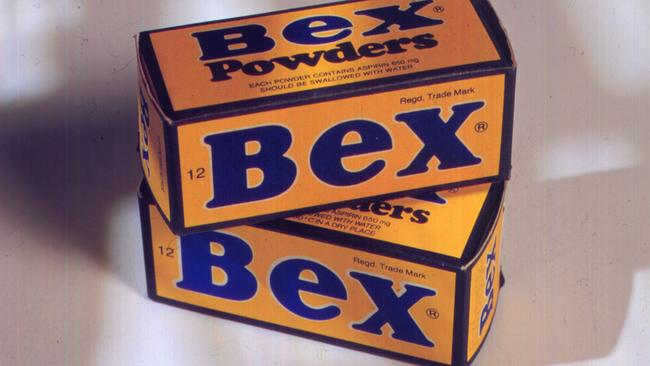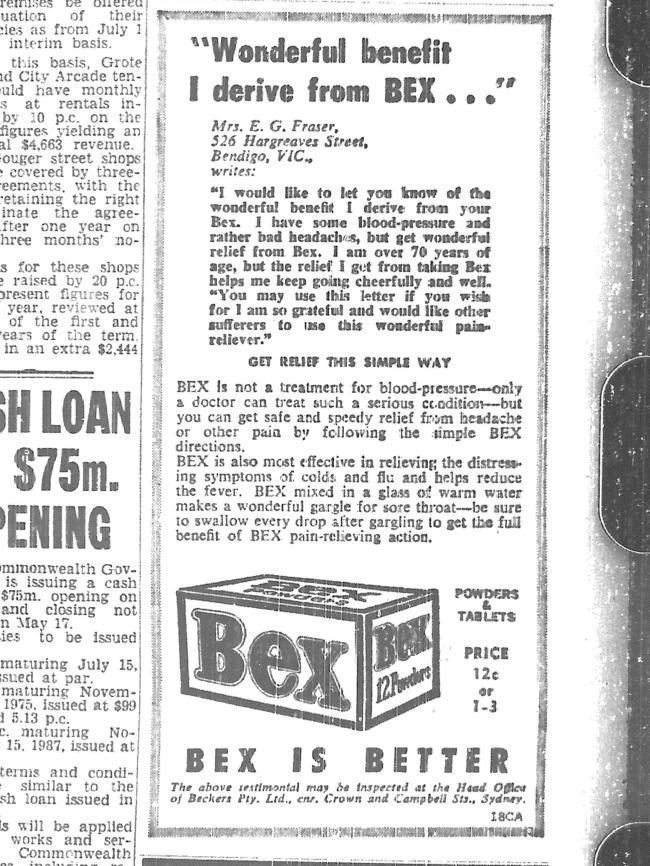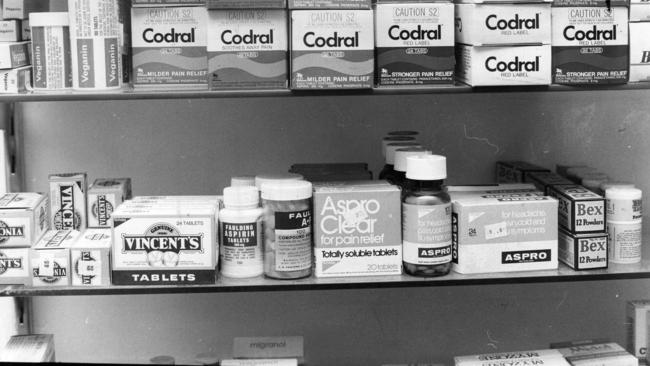Bex: Australia’s APC cure-all that was addictive and caused kidney damage
IN the 1950s and 60s, Bex was Australia’s most-loved medicine, thanks to the enormously successful marketing campaign: “have a cup of tea, a Bex and a good lie down”. But Bex was damaging people.

SA News
Don't miss out on the headlines from SA News. Followed categories will be added to My News.
- Remember when Chryslers were made in Adelaide?
- Sigalas, the Greek milk bar that shook up 1960s Adelaide
WHEN former prime minister Kevin Rudd told journalists speculating that he was trying to reclaim the Labor leadership to have “a cup of tea, a Bex and a good lie down”, younger members of the media pack look puzzled.
They had not heard such an expression before, but to the children of the Baby Boomer generation, the phrase was immediately recognisable.
It was in the late 1950s and throughout the ’60s that the marketing slogan entered the vernacular. Bex, the analgesic made up of aspirin, phenacetin and caffeine (APC), became an Australian icon. It was recommended to treat aches and pains, headaches, colds, flu, fevers, rheumatism and for “calming down”.
Dissolving a Bex (or the similar product, Vincent’s) in a cup of tea, or taken with other stimulants such as cola drinks became particularly common among housewives. It was widely available and sometimes taken up to three times a day.
Aggressive marketing from drug companies meant it was even common to pop a Bex or Vincent’s powder in children’s lunch boxes “just in case”.
It wasn’t until the 1970s that doctors and health experts realised these formulations were responsible for kidney disease and addiction, and were carcinogenic. Phenacetin was finally pulled from the market by the late ’70s. But the damage had already been done. In the years that followed World War II, Australia led the world in APC consumption — and in the number of deaths it eventually caused.

Women resorted to “a cup of tea, a Bex and a good lie down” so often that in 1965 it became the title of a popular play by John McKellar.
The phrase is still instantly recognised by the children of that generation. So many people had an aunt, a mother, a sister, or a friend who were addicted to APCs. Many of them died from related kidney disease.
Readers of our Adelaide Remember When Facebook page recently responded to a post on the Bex phenomenon with memories of their own experiences.
Rick Cooper wrote: “For a while, I lived in Hamley Bridge and the railway was the playground, transport and just about everything else for us kids. At one stage, Vincent’s had a sign on every fence along the railway lines with the countdown in miles until you reached Adelaide. The blue, yellow and white signs said ‘X miles to relief with Vincent’s powders’.”
Trish Simpson recalled how her father was addicted to Bex and ended up with terrible kidney problems: “We always had Bex in the house and I remember taking them when I was younger. Eventually they removed the damaging ingredient and Bex wasn’t as effective. Not sure how much longer they survived after that.”

Deborah Wise reminisced that as a child she loved Bex: “If we had a sore throat, Mum would mix a powder in a teaspoon of honey. Man, it tasted good! I suppose it eased the symptoms as well. I’m pretty sure that my Dad used to take a Bex first thing every morning.”
And Adele Andrews contributed: “I was an operating room nurse in the late 1960s and one of Adelaide’s top renal surgeons gathered all the OR staff into the theatre one day to show them a shrivelled-up kidney he had just removed from a 32-year-old woman. All he said was ‘Bex powder addiction, take note’. I had never taken any APC and was not about to start after that lecture. They should have been banned much earlier.”
Concerns about the rates of consumption of the popular analgesics first surfaced in 1962 and resulted in a series of public health warnings.
They seemed to have a minimal impact until 1966, when kidney specialist Priscilla Kincaid-Smith — after noticing a serious rise in women presenting with kidney disorders — conducted a series of experiments on rats.
\She proved that APC powders were linked to serious kidney disease and the Government of the day began to take notice. In 1967, the National Health and Medical Research Council recommended that phenacetin be removed from the pharmaceutical benefits list, which saw Vincent’s eliminate the compound from its powders that same year, replacing it with salicylamide, which was from the same chemical family as aspirin.
Bex, however, continued to include phenacetin in its product but the sustained adverse publicity throughout the 1970s and the mounting evidence that the once “harmless” cure-all was in fact causing serious kidney disease, forced Bex to also drop the substance from its powders in 1975. By 1977, the results of the addiction were becoming very clear and the NH & MRC moved to restrict the availability of all APCs.
And so the Bex and Vincent’s powder era, thankfully, came to an end.
Thinking back to those days, it was just part and parcel of the lifestyle. Just about everyone’s mum or grandma seemed to always have a Bex or Vincent’s powder handy and, with the first sign of a headache, a cold or if they felt they needed a quick “pick me up”, down would go a powder.
It was a vicious circle of addiction, really: the caffeine content gave a sudden rush of energy, which eventually triggered a withdrawal headache, which prompted them to take another powder.
What are your memories of the days of “Have a cup of tea, a Bex and a good lie down”?
Did you have a mum, grandma or aunty, or a male member of your family, affected by it?
Bob Byrne is the author of Adelaide Remember When and posts memories of Adelaide every day on Facebook.com/AdelaideRememberWhen


